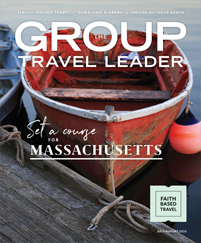Characterized by rugged individualism and the elusive dream of “Manifest Destiny,” the American Frontier continues to dazzle the imagination. Though the days of the Wild West may be long gone, the legacy of train robbers, cowboys and U.S. marshals is very much alive in the states of America’s Crossroads — Arkansas, Kansas, Missouri and Oklahoma — where groups can delve into history through cowboy poetry nights, live gunfights and so much more.
Fort Smith National Historic Site
Fort Smith, Arkansas
Spanning roughly 80 years of history, Fort Smith National Historic Site exposes visitors to some of the most vivid examples of Wild West culture, highlighting the lives of U.S. marshals, Native Americans and settlers during the Gold Rush.
The property was the site of two military forts and a federal court, where the infamous “hanging judge” Isaac C. Parker presided for 21 years over lawless Indian Territory. During a tour of the courthouse and jail buildings, visitors learn the true story of Parker’s background, in contrast to his depiction in many Western books and films as a ruthless hand of justice.
“He was a very misunderstood character,” said Cody Faber, park ranger at the historic site. “He was actually very anti-capital punishment, but it was the law at the time.”
As people explore the grounds, they will find an American flag with 37 stars, just as the fort would have displayed during the mid-19th century, as well as the federal court’s notorious gallows. There is also a Trail of Tears National Historic Trail along the Arkansas River, recognizing the forced migration of Southwestern Indian tribes.
Four times each year, Fort Smith holds a “Night Court,” where the public gathers in the courthouse to watch actors play out real transcripts from murder trials that took place during the 1800s and 1900s. After a discussion, the audience decides on a verdict, and the historical outcome is then revealed.
Other events throughout the year include Civil War re-enactments, artillery demonstrations and discussions led by Native American groups.
Patee House Museum and Jesse James Home
St. Joseph, Missouri
Once a luxury hotel, the Patee House marks the beginning of the Pony Express mail service, as well as the end of Jesse James, both icons in Western lore.
“In 1858, John Patee built this hotel knowing that people would need a place to stay along the route out West,” said Gary Chilcote, director of the museum.
During the 1860s, the hotel briefly housed the headquarters of the Pony Express, which played a crucial role in communication between the East and West before the telegraph was introduced. These horseback riders confronted outlaws, endured Indian attacks and withstood weather conditions to carry messages across untamed land, completing the passage in just 10 days.
During the Civil War, Union marshals took control of the hotel and used the upstairs office as a courtroom. At least seven men were taken across the street for public hangings, and visitors can find a replica of the gallows in the museum.
In 1882, the legendary outlaw and train robber Jesse James was shot and killed by Robert Ford in his home just a block from the hotel, and the house has been relocated to the museum grounds. Several items from his grave are featured inside.
“We don’t try to make him a hero,” said Chilcote. “We tell the story like it is.”
To commemorate this colorful past, the house contains two floors of exhibits. Groups can climb aboard an 1860-era train or take a whirl on a 28-foot carousel. Other highlights include a blacksmith shop, a dressmaker’s shop and a wing with Western art by George Warfel. Some of the paintings depict famous Westerners that stayed at the hotel during its prime.
In June, the city will take part in the National Pony Express Re-Ride, an annual re-enactment of the daring horseback journey between St. Joseph and Sacramento, California. More than 600 riders will participate in the relay, which lasts 10 days, just as the journey did during the 1800s. Many people come out to watch the event.











